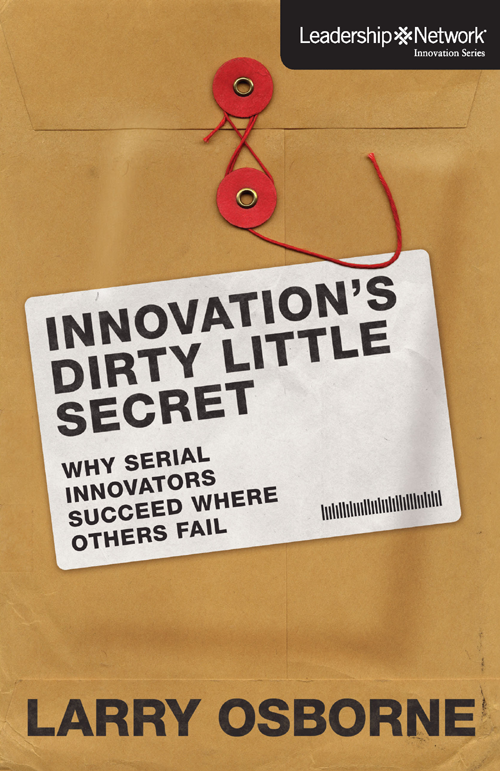I nnovation has a secret, a dirty little secret.
Those who extol the necessity of innovation seldom mention it. They try to sweep it under the rug or tuck it away in the closet. They ignore it in the hope that it will just go away. Yet its shadow looms over every attempt we make to break out of the box and try something new.
Make no mistake. If you have dreams of blazing new trails or championing major changes, this dirty little secret will smack you upside the head before youre done. You cant avoid it. Its the dark side of the creative process.
What is the dirty little secret of innovation?
Its simply this: most innovations fail.
They always have. And they always will.
It doesnt matter whether were talking about a new product, a new program, or a new process. It can be a new company or even a new church. When it comes time to start something new or make a major change, the surest horse you can bet on is the one called Failure.
Youd never know this if you listen to the people who write and speak about leadership and innovation. They often make it sound as if out-of-the-box thinking, burn-the-boats risk-taking, and gutsy leadership are all it takes to win the race and rise to the top.
But despite the great press and sizzle that surrounds the idea of innovation, the fact is that most attempts at innovation and major change crash and burn. Even organizations and leaders who are famous for cutting-edge, innovative strategies have a far longer list of failures than successes.
Now Im not saying that all of our great ideas are doomed to failure. Im not saying that change and innovation are too dangerous to try at home. And Im certainly not suggesting that change and innovation are unimportant or unnecessary.
No, the pundits are right. If we fail to innovate and change, we eventually will lose the race. Well fall to the bottom of the pile and slide into organizational irrelevance.
But that doesnt change the truth that innovation always carries significant risks. Failure is far more common than most aspiring leaders realize and far more likely than the zealous advocates of innovation are willing to admit.
In fact, failure is an integral part of the change process.
AUTOS, AIRPLANES, AND THE INTERNET
Imagine for a moment that you had tons of money to invest when the combustible engine was first invented. Now imagine that you also had the foresight to grasp how profoundly it would alter the way we live, spawning new industries and radically changing our global culture, creating new pockets of enormous wealth.
Since you couldnt know which specific businesses would rise to the top, you probably would have wisely invested as broadly as possible in as many of the new automotive companies as you could find.
But if you had done this, you would have gone flat broke. Rather quickly, because almost all of the innovative startups in the automobile industry went belly up.
The same is true of the airline industry. While manned flight has profoundly changed the way we live, if you had invested money in all of the early airline companies, youd have nothing to show for it today. Most of them went under. Very few made any significant profits.
Ditto for the internet. Its an understatement to say that the internet has changed everything. But those who jumped in too quickly and invested in everything that looked remotely promising lost everything.
Why?
As always happens, innovations evil twin showed up to crash the party. Despite its game-changing potential and all the talk about a new economy with a new set of rules, the old rules prevailed. And most of the bleeding-edge early adopters and the first-to-market companies (the darlings of the investment community) crashed and burned.
WHY INNOVATION GETS SUCH GOOD PRESS
So if failure is such an integral part of innovation and change, why even bother with it at all? Why does something so wrought with pain and disappointment get such good press?
One reason is the influence of a niche industry that has become big business. Billions are spent each year on seminars, training events, and books that promise success to leaders (and pretty much anyone else) who are willing to take a big risk to try something radically new.
If you want to fill a room, sell lots of books, and charge up the troops, its counterproductive to point to a high failure rate. In fact, its a guaranteed way to cut down on sales and limit speaking engagements. So no one talks about it. Instead, the motivational gurus focus on stories of against-all-odds success and ignore the many casualties along the way.
A second reason why innovation gets such good press is that most failures arent all that spectacular or important. We never hear about them because they arent newsworthy. A huge percentage of new initiatives never even get off the ground, and among the few that do, many crash and burn with little fanfare.
Why?
Because if these failures arent connected with our company or our employer (or something that makes the national news), we arent likely to notice them.
The same holds true for new businesses, church plants, and other startups. There are countless failures. Think of the trendy new clothing store in the local mall. It used to be a Chinese takeout. Before that, it was a boutique wine shop. Each of these changes represents a failed dream, a likely bankruptcy, and a ton of heartache and soul searching. But if it wasnt our dream, our bankruptcy, or our heartache, we arent likely to have noticed.
A third reason why innovation gets such good press is simply human nature. We dont like to think about negative things, even if theyre inevitable. How many people do you know who adequately plan and prepare for their death? The odds that we will die are astronomical. But most of us would rather not think about this inevitability at least not right now.
Its the same with failures of innovation and leadership. They surround us. But wed rather not think about them. We chalk up the failures of others to foolish ideas, bad planning, or inept leadership. We think we are different. We cant imagine the possibility that the changes we champion and the great ideas we have just might not be so great after all. Were sure that our ideas will succeed where others have failed.
This helps to explain why the dirty little secret of failure remains such a well-kept secret. Motivational gurus dont want us to think about it. And even though failure is incredibly common, most of these failures dont hit close enough to home to notice. On top of that, wed rather not think about it or plan for it. Its not as exciting and sexy as dreaming and thinking about our latest idea for the next big thing.












 network
network